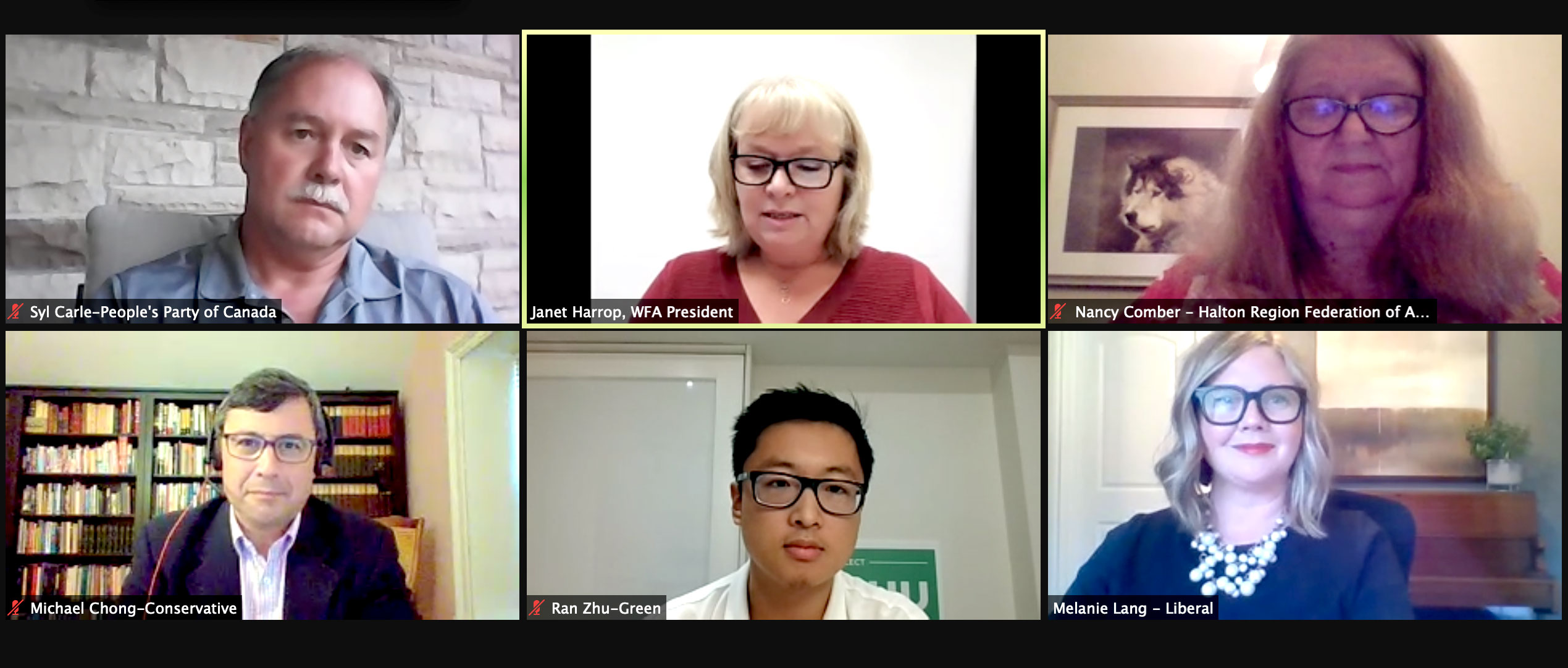WELLINGTON COUNTY – Wellington-Halton Hills candidates talked supply management, the importance of broadband internet and the effects of climate change in a recent debate focused on agriculture.
In attendance at the event, hosted by Wellington Federation of Agriculture (WFA), were Conservative Party incumbent Michael Chong, Liberal Party candidate Melanie Lang, the Green Party’s Ran Zhu and the People’s Party of Canada’s Syl Carle.
NDP candidate Noor Jahangir did not attend.
Priorities for the agriculture sector
WFA president and moderator Janet Harrop opened the discussion by asking candidates what, from their perspective, are the top two priorities for Ontario’s agricultural sector.
For Chong, the number one priority was ensuring the government finalizes a compensation program for supply management processors affected by the Trans Pacific Partnership and the Canada European Union Trade Agreement.
He said the commitments “were made many years ago in some cases and they still have yet to be delivered on.”
The second priority for Chong is to “harmonize” product regulations with the United States and streamline federal slaughter regulations to allow local producers to utilize provincial local abattoirs to be certified to export their products on an international scale.
“I think that would open up much more slaughter capacity, reduce travel distances for cattle and for swine and other products between farm gate and the slaughter facility and is something I think could really help those sectors,” he explained.
Carle placed focus on the carbon tax as his top priority, which he asserted the PPC would scrap, saying it’s “the biggest issue facing farmers and consumers for their products.”
He added the federal government needs to improve its processing capacity, which would potentially allow for more jobs for Canadians. He noted there is currently no accessible capacity here in Ontario.
Zhu linked climate change, coupled with extreme weather events, as a top issue affecting farmers, adding it will threaten crops and livestock.
“In 2021 the Canadian prairies are experiencing what perhaps is the worst drought in the history of the country and together with unprecedented heat weaves with potentially devastating consequences for farms in our region too and the communities that depend on them,” he explained.
Zhu said he also wants to see more products sourced locally in Canada as opposed to relying on imports, adding there are items that could easily be produced in Wellington-Halton Hills.
“But we have chosen by way of our trade and economic development policies to source them elsewhere,” he explained.
“I don’t have to reiterate how important eating local and shopping local, doing farming locally is for local farmers; I will be advocating for that.”
Lang said for her, the top two priorities are rural broadband and $10-per-day childcare.
The pandemic has showcased the need for technology, she explained, adding farm practices are becoming much more reliant on technologies that require broadband.
Lang added internet availability also impacts access to mental health services.
“Our learning needs and our working needs from home have certainly been affected by the lack of broadband connectivity but perhaps what people are not broadly aware of is the impact of mental health,” she explained, noting many services are now offered virtually.
“So, if we have populations that are perhaps feeling particularly isolated within a rural setting … It is absolutely imperative that we need to bring broadband further.”
In terms of the childcare program, Lang noted woman are playing an increasingly advanced role in farm operations and management and having the availability of childcare will allow them to “fully step into operations.”
“Women’s contributions …(are) completely imbedded and integrated within the family farm.
“This program will help alleviate that burden on multigenerational farm businesses.”
Broadband internet in rural communities
Echoing Lang, candidates generally agreed increased investment in research to support innovation and improvements in the agriculture sector is needed.
Chong said the government needs to do a better job, not just in terms of getting broadband rolled out to rural areas and farms throughout rural Ontario, but also making sure its affordable.
Highlighting the Conservative plan to deliver affordable high-speed internet to all Canadians by 2025, Chong added the current government has put in place some good initiatives, but “it’s been far too slow,” which he said has caused many municipalities to work with the province in rolling out their own programs.
“This is a federal responsibility,” he continued. “The federal government needs to streamline the current morass that exists in getting broadband support rolled out so we can get the job done more quickly.
“We need to do a better job on it and our commitment is to do it because … we understand how much of a problem this has been in the last 18 months.”
Carle said Canada “ought to consider excluding big players” and allow for more competition from smaller internet providers.
Zhu said the Green Party believes “universal internet access would be to the benefit of Canadians and farmers,” so it is proposing a “baseline quality of service” for the entire country, where outside areas would be provided with broadband service at an affordable price.
A recorded version of the full debate can be found on the WFA’s Facebook page.




